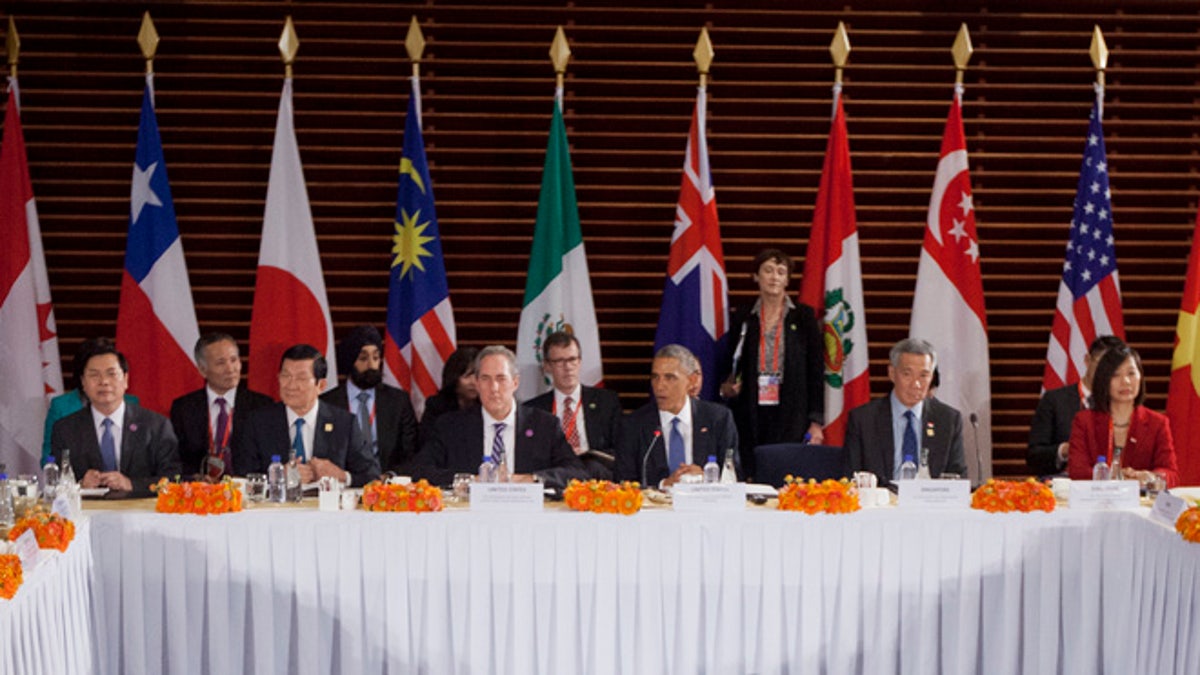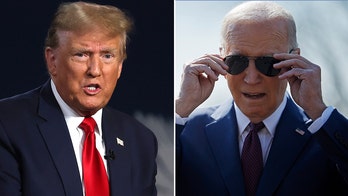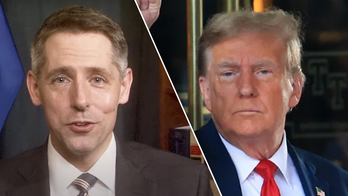
Nov. 10, 2014: U.S. President Obama, center, speaks during his meeting with leaders of the Trans-Pacific Partnership countries, in Beijing. (AP)
The United States and 11 Pacific Rim nations agreed Monday on the Trans-Pacific Partnership -- a historic, international deal backed by President Obama that continues to create divisions on both ends of the U.S. political spectrum.
Negotiators took nearly six years to complete the deal, which if ratified is projected to impact 40 percent of the global economy. The deal was reached after a weekend of negotiations in Atlanta.
"We think it helps define the rules of the road for the Asia-Pacific region," said U.S. Trade Representative Michael Froman, adding that negotiators had been working on the deal as late as 5 a.m. Monday morning.
The deal is designed to encourage trade between the United States, Australia, Brunei, Canada, Chile, Japan, Malaysia, Mexico, New Zealand, Peru, Singapore and Vietnam. It would eliminate tariffs that are considered barriers to trade, including more than 18,000 imposed on U.S. exports, according to the White House.
“This partnership levels the playing field for our farmers, ranchers and manufacturers,” Obama said. “It’s an agreement that puts American workers first and will help middle-class families get ahead.”
Secretary of State John Kerry also voiced his approval of the deal.
“It will provide new and meaningful access for American companies, large and small,” Kerry said. “This agreement will level the playing field for American businesses and workers.”
Critics of the plan, including several 2016 presidential candidates, have raised such concerns about the potential for currency manipulation and whether it will result in fewer U.S. jobs.
The deal still has to be approved by Congress, amid widespread opposition from Democrats concerned about job loss and suspicion among Republicans about Obama's team having negotiated a bad deal.
The president must wait 90 days before signing the pact, and only then will Congress begin the voting process, which could push the vote date well into 2016.
Senate Majority Leader Mitch McConnell, R-Ky., warned Monday that the deal would face “intense scrutiny” on Capitol Hill.
“The Trans-Pacific Partnership is potentially one of the most significant trade deals in history,” he also said. “But serious concerns have been raised on a number of key issues.”
The deal is likely to become a fiery issue in the 2016 presidential race.
Republican candidates who oppose the deal include billionaire businessman and front-runner Donald Trump, former Arkansas Gov.Mike Huckabee and former Pennsylvania Sen. Rick Santorum.
Democrat frontrunner Hillary Clinton has yet to take a clear stance on the issue, arguing in part that the text of the deal has yet to be released.
However, primary challenger Sen. Bernie Sanders, a longtime opponent of the deal, blasted it again Monday. He called the deal “disastrous,” echoing concerns from left-wing groups and labor unions about the deal benefitting multinational corporations over American workers.
"I am disappointed but not surprised,” said Sanders, a Vermont Independent who vowed to do everything he can in Congress to defeat the plan. "Wall Street and other big corporations have won again.”
AFL-CIO President Richard Trumka urged lawmakers and others to scrutinize the deal when the details emerge.
“We ask the administration to release the text immediately,” he said. “Rushing through a bad deal will not bring economic stability to working families. … We will evaluate the details carefully and work to defeat this corporate trade deal if it does not measure up.”
The Obama administration has also pursued the deal as part of a strategy to increase U.S. influence in fast-growing Asia and to counter China's growing dominance.
China, the world's second-largest economy, is not part of the agreement, but potentially could join later.
Late last month, 160 members of Congress from both parties wrote Obama to urge that the agreement limit the ability of governments to lower the value of their currencies to gain a trade advantage. A cheaper currency makes imports less expensive. The final pact, however, doesn't include provisions on currency.
The Associated Press contributed to this report.




